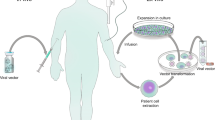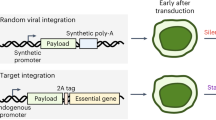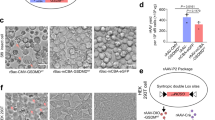Abstract
Retroviruses are, at present, the most efficient integrative vectors available for gene delivery. However, these viruses are still limited by relatively low titres. Although several protocols exist to improve virus titre most of them are time-consuming and unable to provide sufficient virus for in vivo applications. Virus titre can be enhanced by polybrene and other cationic agents. By investigating a broad range of cationic agents for their ability to enhance virus infectivity we found that both ecotropic and amphotropic retrovirus infection could be increased. In particular, the lipopolyamine dioctadecylamidoglycylspermine (DOGS) gave up to one order of magnitude enhancement above polybrene- mediated infection without cytotoxicity. To increase virus infectivity further we combined the enhancing effect of DOGS on virus infectivity with concentration of virus particles by ultrafiltration to reach titres of 1 × 109 IU/ml. The in vivo transduction of regenerating rat liver, by an amphotropic retrovirus was increased approximately five-fold by the addition of DOGS compared with virus alone. There was no animal toxicity observed following the administration of DOGS. The improved transduction efficiency seen both in vitro and in vivo following the co-administration of DOGS/virus complexes may be useful for future gene therapy applications.
This is a preview of subscription content, access via your institution
Access options
Subscribe to this journal
Receive 12 print issues and online access
$259.00 per year
only $21.58 per issue
Buy this article
- Purchase on Springer Link
- Instant access to full article PDF
Prices may be subject to local taxes which are calculated during checkout
Similar content being viewed by others
Author information
Authors and Affiliations
Rights and permissions
About this article
Cite this article
Themis, M., Forbes, S., Chan, L. et al. Enhanced in vitro and in vivo gene delivery using cationic agent complexed retrovirus vectors. Gene Ther 5, 1180–1186 (1998). https://doi.org/10.1038/sj.gt.3300715
Received:
Accepted:
Published:
Issue Date:
DOI: https://doi.org/10.1038/sj.gt.3300715
Keywords
This article is cited by
-
The Future of Gene Therapy: A Review of In Vivo and Ex Vivo Delivery Methods for Genome Editing-Based Therapies
Molecular Biotechnology (2024)
-
Optimization of the Transductional Efficiency of Lentiviral Vectors: Effect of Sera and Polycations
Molecular Biotechnology (2013)
-
Efficient Enhancement of Lentiviral Transduction Efficiency in Murine Spermatogonial Stem Cells
Molecules and Cells (2012)
-
Overexpression of connexin 43 using a retroviral vector improves electrical coupling of skeletal myoblasts with cardiac myocytes in vitro
BMC Cardiovascular Disorders (2006)
-
Long-term transgene expression by administration of a lentivirus-based vector to the fetal circulation of immuno-competent mice
Gene Therapy (2003)



